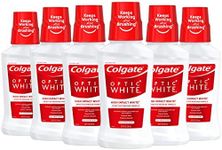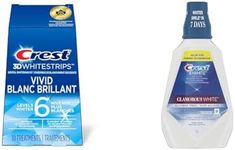Buying Guide for the Best Whitening Mouthwash
Choosing a whitening mouthwash can be a great way to enhance your oral care routine, especially if you're looking to brighten your smile without making big changes to your daily habits. The right mouthwash can help remove surface stains, freshen breath, and support overall oral health. When picking a whitening mouthwash, it's important to understand the key features and ingredients that make each product unique, so you can find one that fits your needs and preferences.Whitening AgentThe whitening agent is the ingredient responsible for removing or reducing stains on your teeth. Common whitening agents include hydrogen peroxide, carbamide peroxide, or mild abrasives. Hydrogen peroxide is often used for its ability to break down stains chemically, while some mouthwashes use gentle polishing agents. If you want noticeable whitening, look for a product with a proven whitening agent like hydrogen peroxide. If you have sensitive teeth or want a milder effect, choose a mouthwash with a lower concentration or a non-peroxide formula. Your choice should depend on how much whitening you want and how sensitive your teeth and gums are.
Alcohol ContentAlcohol is sometimes included in mouthwash to help kill bacteria and preserve the product, but it can also cause a burning sensation or dry mouth for some people. Alcohol-free mouthwashes are gentler and less likely to cause irritation, making them a good choice for those with sensitive mouths or dry mouth issues. If you don't mind a stronger sensation and want a more traditional mouthwash feel, an alcohol-based option might be suitable. Consider your comfort and any sensitivity when deciding between alcohol-based and alcohol-free formulas.
Fluoride ContentFluoride is a mineral that helps strengthen tooth enamel and prevent cavities. Some whitening mouthwashes include fluoride for added cavity protection, while others do not. If you're looking to boost your cavity defense while whitening your teeth, choose a mouthwash with fluoride. If you already get enough fluoride from your toothpaste or prefer to avoid it, a fluoride-free option may be better. Think about your overall oral health needs and whether you want extra cavity protection when making your choice.
Sensitivity FormulaSome whitening mouthwashes are specially formulated for people with sensitive teeth and gums. These products often use gentler ingredients and avoid harsh chemicals that can cause discomfort. If you know you have sensitive teeth or have experienced irritation from other whitening products, look for a mouthwash labeled as suitable for sensitive mouths. If sensitivity isn't a concern for you, you can consider standard formulas for potentially stronger whitening effects.
FlavorFlavor can make a big difference in how enjoyable your mouthwash is to use. Common flavors include mint, spearmint, and sometimes more unique options like citrus. A pleasant flavor can encourage you to use the mouthwash regularly, which is important for seeing results. If you dislike strong or artificial flavors, look for a milder or natural-flavored option. Your personal taste preference should guide your choice here, as regular use is key to effectiveness.
Stain Prevention vs. Stain RemovalSome whitening mouthwashes focus more on preventing new stains from forming, while others are designed to actively remove existing stains. If your main goal is to keep your teeth from getting stained by coffee, tea, or wine, a stain-prevention formula may be best. If you want to lighten teeth that are already stained, look for a product that emphasizes stain removal. Consider your habits and whether you want to maintain your current shade or actively whiten your teeth.









